Quarterly
Research & News

From the Director’s Desk
The first issue of the Quarterly Research & News was launched in April 2008, thus it has just completed fifteen years. With the blessings and support of Dr. Peter Armacost, Rector (2004-2012) Quarterly was designed with considerable thinking and planning to be the repository of institutional memory, reporting the activities of CPPG and encouraging the research publications of faculty, students and outside scholars. It was conceived to be heavy on the reporting of diverse views of the speakers, thus breaking disciplinary boundaries and encouraging deliberation on issues and policies from a multidisciplinary perspective. At the time of its inception our expectation was that we would publish four issues a year. But, by the end of the year, we realized that it was an expectation based on naivety and beyond our existing faculty capacity. So, we amended and tried publishing Quarterly bi0annually and were considerably successful. However, until 2016, it remained a duo team- me and Raheem ul Haque. Through dedication and determination, Quarterly’s reporting, synergizing quality and content improved. We were also successful in soliciting articles, getting them peer reviewed and adding book reviews while sustaining its publication. In 2016, the Quarterly got a real boost as Ms. Saba Shahid joined the tea,, and thus by 2021 the quality, content and regularity of Quarterly’s publication became routinized. Unfortunately, in late 2019 the menace of COVID 19 , its spread and continuing lingering effects disrupted the publication momentum. In 2021, we decided to handover publication of the Quarterly to students on experimental basis but that did not proves fortuitous.
Therefore, we have decided to rejuvenate and restore the original design and spirit of the Quarterly-to sustain it as a repository of institutional memory and a platform for students’ and faculty’s innovative, trend setting ideas/reflections and research. The faculty and the editorial team have resolved to make it bi-annual publication from 2024, to be published in July and January. Meanwhile, after almost fifteen months of discussion and deliberation among the faculty, we are ready with a new issue of the Quarterly, which reflects the CPPG activities and provides a sample of students’ research over the past few years. As always, we welcome critical appreciation, comments and feedback.
Dr. Saeed Shafqat
Articles
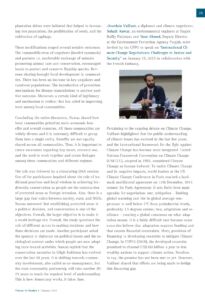
International Climate Change Negotiations: Challenges to Justice and Security
Jourdain Vaillant, a diplomat and climate negotiator; Sohaib Anwar, an environmental engineer at Hagler Bailly Pakistan; and Noor Ahmed, Deputy Director at the Environment Protection Agency Punjab, were invited by the CPPG to speak on “International Climate Change Negotiations: Challenges to Justice and Security”Pertaining to the ongoing debate on Climate Change, Vaillant highlighted that the public understanding of climate issues has evolved in the last few years, and the international framework for the fight against Climate Change has become more integrated.
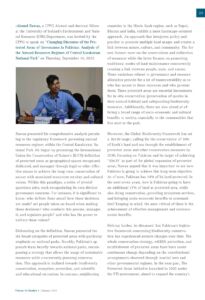
Changing Discourse of the Protected Areas of Governance in Pakistan: Analysis of the Natural Resources Regimes of Central Karakoram National Park
Ahmed Nawaz, a CPPG Alumni and doctoral fellow at the University of Iceland’s Environment and Natural Resource (ENR) Department, was invited by the CPPG to speak on “Changing Discourse of the Protected Areas of Governance in Pakistan: Analysis of the Natural Resources Regimes of Central Karakoram National Park”Nawaz presented his comprehensive analysis pertaining to the regulatory framework governing natural resources regimes within the Central Karakoram National Park.
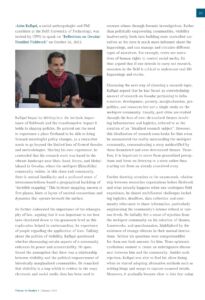
Reflections on Gwadar: Troubled Fieldwork
Asim Rafiqui, a social anthropologist and PhD candidate at the Delft University of Technology, was invited by CPPG to speak on “Reflections on Gwadar: Troubled Fieldwork” Rafiqui began by delving into the intrinsic importance of fieldwork and the transformative impact it holds in shaping policies. He pointed out the need to experience a place firsthand to be able to bring forward meaningful policy changes, as a researcher needs to go beyond the limited lens of formed theories and methodologies.
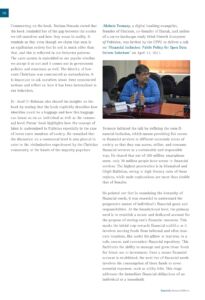
Financial Inclusion: Public Policy for Open Data Driven Solutions
Mohsin Termezy, a digital banking evangelist, founder of Finclude, co-founder of Dastak, and author of a sector landscape study titled Fintech Ecosystem of Pakistan, was invited by the CPPG to deliver a talk on “Financial Inclusion: Public Policy for Open Data Driven Solutions” Termezy initiated the talk by defining the term financial inclusion, which means providing fair access to financial services to different economic strata of society so that they can access, utilize, and consume financial services in a sustainable and responsible way.
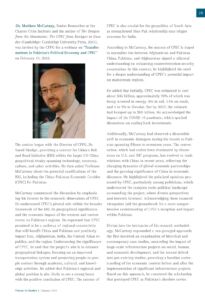
Transformations in Pakistan’s Political Economy and CPEC
The session began with the Director of CPPG, Dr. Saeed Shafqat, providing a context for China’s Belt and Road Initiative (BRI) within the larger US-China geopolitical rivalry spanning technology, economy, culture, and cyber activities. He then asked Professor McCartney about the potential ramifications of the BRI, including the China-Pakistan Economic Corridor (CPEC) for Pakistan. McCartney commenced the discussion by emphasizing his interest in the economic dimensions of CPEC. He underscored CPEC’s pivotal role within the broader framework of the BRI, its geographical significance, and the economic impact of the western and eastern routes on Pakistan’s regions.
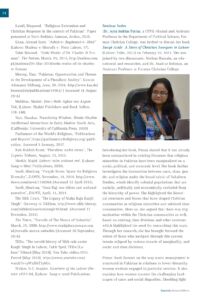
Swept Aside A Story of Christian Sweepers in Lahore
Dr. Ayra Indrias Patras, a CPPG Alumni and Assistant Professor in the Department of Political Science, Forman Christian College, was invited to discuss her book Swept Aside A Story of Christian Sweepers in Lahore (Lahore: Folio, 2023) on February 20, 2023. She was joined by two discussants: Neelam Hussain, an educationist and researcher, and Dr. Asad ur Rehman, an Assistant Professor at Forman Christian College.
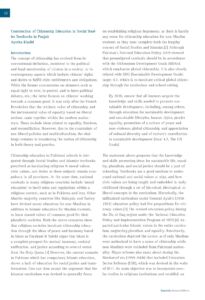
Construction of Citizenship Education in Social Studies Textbooks in Punjab
The concept of citizenship has evolved from its conventional definition, restricted to the political and legal membership of citizens in a society, to its contemporary aspects which include citizens’ rights and duties to fulfill civic entitlements and obligations. While the former concentrates on elements such as equal right to vote, to protest, and to have political debates, etc.; the latter focuses on citizens’ working towards a common good.
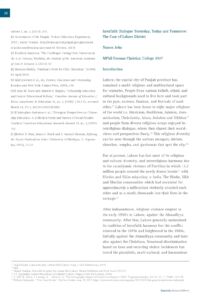
Interfaith Dialogue Yesterday, Today and Tomorrow: The Case of Lahore District
Lahore, the capital city of Punjab province has remained a multi-religious and multicultural space for centuries. People from various beliefs, ethnic and cultural backgrounds used to live here and took part in the joys, sorrows, famines, and festivals of each other.17 Lahore has been home to eight major religions of the world i.e. Hinduism, Buddhism, Jainism, Zoroastrianism, Christianity, Islam, Judaism and Sikhism.
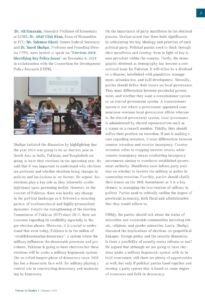
Elections 2024: Identifying Key Policy Issues
Shafqat initiated the discussion by highlighting that the year 2024 was going to be an election year in South Asia as India, Pakistan, and Bangladesh are going to have their elections in the upcoming year. He said that it was important to understand why elections are pertinent and whether elections bring changes in policies and institutions as we foresee. He argued that elections play a key role as they inherently confer legitimacy upon governing bodies.
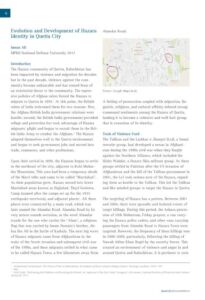
Evolution and Development of Hazara Identity in Quetta City
The Hazara community of Quetta, Balochistan has been impacted by violence and migration for decades but in the past decade, violence against the community became unbearable and has roused fears of an existential threat to the community. The repressive policies of Afghan rulers forced the Hazara to migrate to Quetta in 1894.1 At this point, the British rulers of India welcomed them for two reasons: first, the Afghan-British India government relations were hostile; second, the British India government provided refuge and protection but took advantage of Hazara migrants’ plight and began to recruit them in the British India Army to combat the Afghans.
Editorial Board
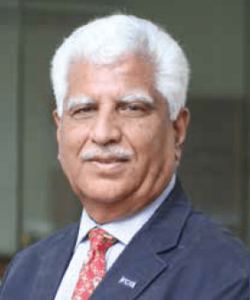
Dr.Saeed Shafqat
Professor & Founding Director
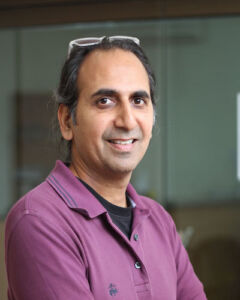
Raheem ul Haque
Assistant Professor / Senior Research Fellow

